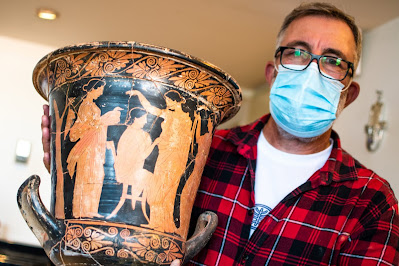 |
| Image Credit - Yoli Schwartz / Israel Antiquities Authority |
Three people, believed to be involved in an illegal antiquities trading network, have been taken into custody as the result of an extensive investigation in Israel. All three individuals are said to be residents of Gush Dan, the densely populated region surrounding the city of Tel-Aviv and have been under surveillance for suspicion of trafficking, illegal possession of antiquities, as well as possible instances of fraud and money laundering. Amir Ganor, the director of the Antiquities Authority's Robbery Prevention Unit told Israeli newspapers that this is one of the "most significant operations carried out in the country against illegal trade in antiquities" involving some €2.5 million worth of ancient art.
During the past several months, the fraud unit in the Tel Aviv district has conducted a joint undercover investigation, in cooperation with the Israel Antiquities Authority and the country's Tax Authority. Yesterday, in the early morning, law enforcement announced that they had conducted search warrants on the apartments of the three unnamed suspects, in warehouses and at a gallery in Tel Aviv.
Law enforcement officers recovered ancient objects and coins most of which dates from the 3rd century BCE through the 11th century CE. The objects are believed to have been removed from their context during clandestine excavations throughout the Mediterranean basin and North Africa and include Red-figure and Black-figure attic pottery from Ancient Greece and Italy, as well as jugs, vases, coins from the Seleucid Hellenistic period, jewellery, statues, and figurines. Officers also recovered decorated sarcophagus lids, painted wooden boxes, and objects created with faience from Egypt.
Despite their stunning recovery, the Israel Antiquities Authority has stated that their investigation is just now getting started. The country will be reaching out to art and antiquities enforcement counterparts in other countries to discuss the origins and perhaps movements of the objects before their arrival to Israel.
Two of the suspects have been listed in open source reports as a 70-year-old gallery owner and his 40-year-old son though other article sources indicate that none of the detainees were licensed traders in ancient art though some of the suspects were in contact with licensed dealers. The third suspect has been described as being a 40-year-old resident of the city of Holon, located 10 km outside the Tel Aviv metropolis.
All three men were brought in for questioning at the offices of the fraud unit in the Tel Aviv district. Carrying out illegal excavations at antiquities sites in Israel without a license constitutes a severe violation of the country's patrimony law. If convicted as such, culprits can be sentenced to up to five years in prison.




No comments:
Post a Comment